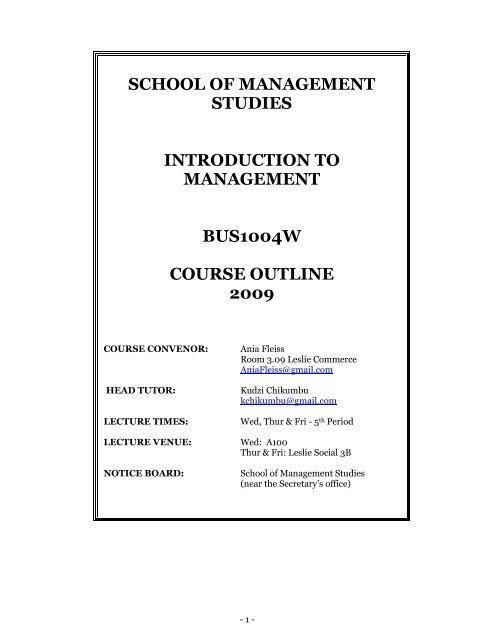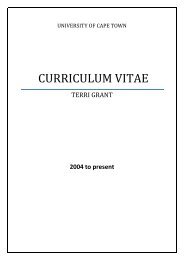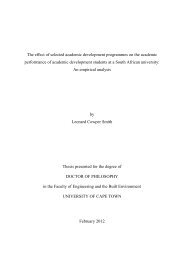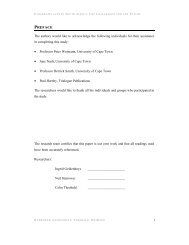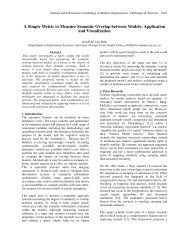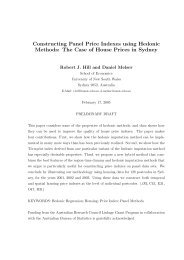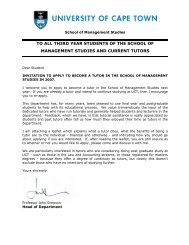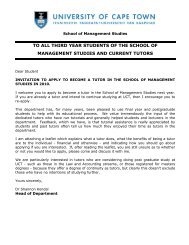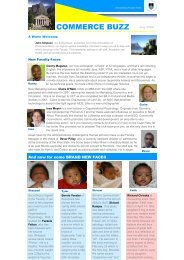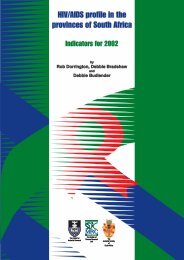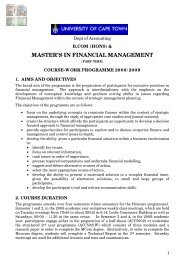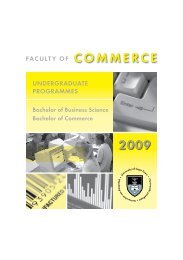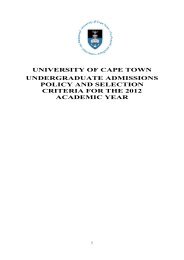Course Outline BUS1004W
Course Outline BUS1004W
Course Outline BUS1004W
Create successful ePaper yourself
Turn your PDF publications into a flip-book with our unique Google optimized e-Paper software.
SCHOOL OF MANAGEMENT<br />
STUDIES<br />
INTRODUCTION TO<br />
MANAGEMENT<br />
<strong>BUS1004W</strong><br />
COURSE OUTLINE<br />
2009<br />
COURSE CONVENOR:<br />
HEAD TUTOR:<br />
LECTURE TIMES:<br />
LECTURE VENUE:<br />
NOTICE BOARD:<br />
Ania Fleiss<br />
Room 3.09 Leslie Commerce<br />
AniaFleiss@gmail.com<br />
Kudzi Chikumbu<br />
kchikumbu@gmail.com<br />
Wed, Thur & Fri - 5 th Period<br />
Wed: A100<br />
Thur & Fri: Leslie Social 3B<br />
School of Management Studies<br />
(near the Secretary’s office)<br />
- 1 -
COURSE OBJECTIVES<br />
In this course, we aim to provide a general introduction in management to students whose field of study is not<br />
management, but whose careers are likely to have a significant managerial component. We try to make sure<br />
that you will be able to understand the concepts and language of management and to be aware of the<br />
relationships among all management disciplines.<br />
The overall objective is to introduce the fundamental areas of management in a broad-based manner, and<br />
encourage awareness of some of the current issues facing managers. The course also has a small business,<br />
service-enterprise orientation to help equip aspirant entrepreneurs and professionals with some of the skills<br />
and aptitudes necessary for managing one’s own business within a challenging and dynamic environment,<br />
using South African examples, where possible and appropriate.<br />
You will have several lecturers in this course. Please feel free to contact your individual lecturers, tutors or the<br />
<strong>Course</strong> Convenor if you are experiencing any difficulties, and do so sooner rather than later, so that we have<br />
time to offer what assistance we can.<br />
COURSE OUTLINE<br />
Each part/module is lectured by a different lecturer with expertise in that field. Please consult Vula regularly to<br />
note any changes.<br />
The Modules for 2009 are:<br />
First Semester<br />
Part I : Business Concepts<br />
Part II : Economics<br />
Part III : Accounting<br />
Second Semester<br />
Part IV : Marketing<br />
Part V : Finance<br />
Part VI : Business Strategy<br />
A further objective of this course is to introduce students to the principles of acceptable written<br />
communication. It is increasingly important in the working environment that documents are drawn up<br />
according to professional standards in terms of structure and format. All essays submitted for this course are<br />
required to be drawn up in accordance with these basic standards. A portion of the mark for each submission<br />
will be awarded for professional structure and format. The required format for written submissions will be<br />
addressed within the first few lectures of the first quarter.<br />
EVALUATION<br />
Tutorials<br />
Test 1<br />
Assignment 1<br />
June examination/test<br />
Test 2<br />
Assignment 2<br />
October/November examination<br />
10%<br />
8%<br />
7%<br />
30%<br />
8%<br />
7%<br />
30%<br />
- 2 -
REQUIREMENTS FOR DP<br />
PLEASE READ THIS SECTION VERY CAREFULLY<br />
In order to qualify for a DP (that is, in order to be permitted to write the October/November examination), a<br />
student must<br />
• attend and participate in a minimum of 75% of all tutorial classes. Please note that this is not a<br />
correspondence course, and that the 25% which may be missed includes any tutorial which you may have<br />
missed due to illness. The onus is on you to sign the tutorial attendance register and to provide<br />
a medical certificate for any missed tutorials.<br />
• satisfactorily complete 75% tutorial assignments (hand-in tutorials), regardless of whether or not you<br />
attended the tutorial session itself (you must obtain an average of 40% for all marked tutorials; this is an<br />
average of all tutorials for the course, regardless of whether or not you handed them in on time – see later<br />
for what happens if your tutorials are handed in late)<br />
• submit 2 satisfactorily completed assignments (you will given more information about the requirements in<br />
class)<br />
• write all tests and examinations<br />
• obtain a minimum year mark of 40%<br />
• obtain a sub-minimum of 50% in the final examination to pass the course.<br />
These requirements will be strictly enforced.<br />
Please note that all work which you submit for marking must be done on an individual basis, except for group<br />
assignments. This means that collaborative work is not acceptable. Copying another person’s work is cheating,<br />
and students suspected of this will be referred to the University authorities.<br />
Late tutorials will not be marked.<br />
Assignments/projects submitted late for this course will incur a penalty of 10% per day, or part thereof (and<br />
this includes Saturdays and Sundays). This will be strictly applied, only a satisfactory medical or other<br />
certificate recognised by the University will be accepted.<br />
Plagiarism Declaration<br />
It is University policy that all work submitted for evaluation must include a plagiarism declaration. Such a<br />
declaration must accompany every tutorial and assignment handed in. Plagiarism Declarations are available<br />
from the secretaries on 4 th Floor Leslie Commerce or from the Vula course website. No tutorials or<br />
assignments will be marked without a plagiarism declaration.<br />
- 3 -
TUTORIALS<br />
Times and venues<br />
Please sign up for a tutorial group by Friday 20 February 2009 by logging onto the Vula website<br />
(https://vula.uct.ac.za) using your UCT username and password, go to <strong>BUS1004W</strong> and to “tutorial sign up”<br />
there you will be able to sign up for tutorials. You will be able to switch your tutorial sign-up in the first week<br />
but not thereafter, so please ensure that you have no clashes.<br />
Tutorials begin in the second week.<br />
• You are not permitted to change tutorial groups, and if you do not attend your designated tutorial, this will<br />
constitute non-attendance. Only the <strong>Course</strong> Convenor is permitted to make reallocations. If you cannot<br />
make a tutorial for a valid reason, and you wish, on a once-off basis, to attend another tutorial, then you are<br />
required to complete a Change of tutorial sheet which may be obtained from the secretary, School of<br />
Management Studies. This form must be taken to the tutorial, where the tutor will sign it. The form must<br />
then be handed to the Head Tutor.<br />
• Any request for an extension or condonation of a late tutorial submission or missed test must be completed<br />
on the form available from the secretary at the School of Management Studies. Full written reasons must<br />
be provided and appropriate documentation must be attached (e.g. medical certificate).<br />
• Please note that for extensions for compassionate reasons (e.g. death in the family) it is best to email or<br />
speak to the <strong>Course</strong> Convenor personally. All correspondence will be treated in the strictest confidence.<br />
Attendance<br />
One single period tutorial will be held per week. You are required to attend a minimum of 75% of all tutorials<br />
in order to qualify for a DP, as described above.<br />
Preparation<br />
You will have a weekly hand-in for your tutorial. You need to hand in 75% of the tutorials in order to obtain<br />
your DP requirement.<br />
Ten randomly selected tutorials will be marked. These 10 marked tutorials will count towards 10% of your year<br />
mark.<br />
You have to hand in your tutorial to your tutor’s box at Management Studies Reception at the specified date<br />
and time. Late tutorials will not be marked but they will count for DP purposes. If you register late for the<br />
course, you are still required to complete and submit all tutorials. It is your responsibility to organise with your<br />
allocated tutor when these must be handed in.<br />
PRESCRIBED TEXT<br />
The prescribed textbook for this course is:<br />
du Toit, GS., Erasmus, BJ. and Strydom, JW. (ed). 2007. Introduction to Business<br />
Management. Cape Town: Oxford University Press.<br />
Please note that the individual lecturers may choose to give you additional reading and not exclusively make<br />
use of the textbook. The textbook also does not cover all six modules and lecturers will provide additional notes<br />
in these cases. The textbook is a resource that will provide you with background information and will be a<br />
useful tool for your future management and business endeavours.<br />
There are several management textbooks available in the library should you require extra material to aid your<br />
understanding. Speak to the assistants at the Commerce Section. They are very helpful.<br />
Material for this course comes from two sources: the lectures (including any handouts provided during lectures<br />
or to which students are referred) and tutorials. All material is examinable, and all sources of material are<br />
equally important.<br />
- 4 -
TESTS AND EXAMINATIONS (Provisional)<br />
Two class tests and two exams will be written. Dates and times are as follows:<br />
Test 1 Wednesday 21 April 17h00-18h30<br />
Test 2 Wednesday 16 September 17h00-18h30 Venue: RW James 1 and 2<br />
Exam 1 Monday 8 June 08h00-11h00 Venue: KRM<br />
Details of the October/November examination will be available during the year.<br />
ASSIGNMENTS<br />
In the first and second semester all students are required to submit an assignment. This assignment is aimed a<br />
linking the different module in that semester. The assignments are integral to the Introduction to<br />
Management course. It is an opportunity for you to apply the theory which you learnt in a practical and<br />
contemporary way. In addition, group work skills will be developed, as your final reports must be a single,<br />
cohesive and integrated piece of work.<br />
There are two Assignments you will have to hand in. Dates and times are as follows:<br />
Assigment 1:<br />
Mini Food Market Project Tuesday 19 May By 11h00 (tutor’s hand-in box)<br />
Assigment 2:<br />
Business Plan Tuesday 13 October By 11h00 (tutor’s hand-in box)<br />
SUMMARY OF IMPORTANT DATES 2009<br />
First semester begins Monday 16 February 2009<br />
Deadline for signing up for tutorials Friday 20 February Project groups finalised week<br />
beginning 23 February<br />
Tutorials begin Tuesday 24 February<br />
First quarter ends Friday 3 April<br />
Second quarter lectures begin Tuesday 14 April<br />
Test 1 Wednesday 21 April, 17h00-18h30<br />
Portfolio due Tuesday 19 May, 11h00<br />
First semester lectures end Wednesday 20 May<br />
June examination Monday 8 June Venue KRM<br />
Second semester begins Monday 27 July<br />
Third quarter ends Friday 4 September<br />
Fourth quarter lectures begin Monday 14 September<br />
Test 2 Wednesday 16 September, 17h00-18h30 Venue RW James 1 and 2<br />
Business Plan due Tuesday 13 October 11:00<br />
Project presentations begin 13 October<br />
Second semester lectures end 27 October<br />
Publication of DP lists To Be Announced<br />
October/November examination To Be Announced<br />
- 5 -
<strong>BUS1004W</strong><br />
Introduction to Management<br />
Provisional Year Planner 2009<br />
Week<br />
Week<br />
begin Public Holiday Section Tut Other Info<br />
First Semester<br />
1 16-Feb<br />
Business<br />
Concepts<br />
2 23-Feb<br />
Business<br />
Concepts Bus 1 Project groups<br />
3 02-Mar<br />
Business<br />
Concepts Bus 2<br />
4 09-Mar<br />
Business<br />
Concepts Bus 3<br />
5 16-Mar Economics Bus 4<br />
6 23-Mar Economics Eco 1<br />
7 30-Mar Economics Eco 2 Mini Food Market<br />
06-Apr<br />
VAC<br />
8 13-Apr Economics Eco 3<br />
9 20-Apr Accounting Test 1: Wed 21/4<br />
10 27-Apr<br />
Monday 27/4 Freedom<br />
Day Accounting Acc 1<br />
11 04-May Friday 1/5 Worker's Day Accounting Acc 2<br />
12 11-May Accounting Acc 3<br />
13 18-May Accounting Acc 4<br />
Portfolio due: Tue<br />
19/5 @11oo<br />
Study 21-May<br />
June Exam: Mon<br />
8/6 @ o8oo<br />
Exams 28-May<br />
Second<br />
Semester<br />
1 27-Jul Marketing Project tut<br />
2 03-Aug Marketing Mark 1<br />
3 10-Aug<br />
Monday 10/8 Public<br />
Holiday Marketing Mark 2<br />
4 17-Aug Marketing Mark 3<br />
5 24-Aug Finance Mark 4<br />
6 31-Aug Finance Fin 1<br />
VAC 07-Sep<br />
7 14-Sep Finance Fin 2<br />
8 21-Sep Finance Fin 3<br />
Test 2: Wed 16/9<br />
@ 17.00<br />
9 28-Sep Wed 24/9 Heritage Strategy Fin 4<br />
10 05-Oct Strategy Strat 1<br />
11 12-Oct Strategy Presentations<br />
Business Plan due:<br />
Tue 13/10 @ 11oo<br />
12 19-Oct Strategy Presentations<br />
Study 28-Oct<br />
Exams 04-Nov<br />
- 6 -
Useful Notes<br />
<strong>BUS1004W</strong> – Introduction to Management<br />
Referencing Guidelines<br />
Harvard Referencing Guidelines:<br />
The Introduction to Management course takes plagiarism extremely seriously and guilty students will<br />
not only automatically be DPR ed from the course, but also handed over to the University Court. It is<br />
thus imperative that all assignments, case-studies and projects for <strong>BUS1004W</strong> are adequately cited<br />
within the body of text, as well as the respective authors/sources referenced at the end of the document<br />
on a separate reference page. In addition, aligned with UCT Commerce standards, it is required that the<br />
Harvard referencing technique be used in all cases.<br />
Following are some examples of how to reference various sources in the Harvard Referencing style as<br />
accepted by <strong>BUS1004W</strong>: for more details please consult:<br />
http://www.lib.uct.ac.za/Training/citationstyles.htm#Author-date<br />
In the body of the essay:<br />
Citing a finding or notion:<br />
In addition, the study found that psychographics were more effective (Laden, 2002).<br />
OR<br />
Laden (2002) found that psychographics were a more effective segmentation tool than<br />
demographics.<br />
Quoting a particular author:<br />
Tucker (2003: 12) argues, "transactional marketing is a relic of the 20th century".<br />
OR<br />
It was argued, "transactional marketing is a relic of the 20th century" (Tucker, 2003: 12).<br />
You do not have to use page numbers in-text when referencing a journal article.<br />
Reference Page/Bibliography Entries:<br />
Books:<br />
Petersen, G. & Phillips, S. 2001. Finance: what does it mean?. New York: Harper & Row Publishers.<br />
Journals:<br />
Peppers, D. 1999. Retailing Financial Services: Transaction to Relationship Marketing. European<br />
Journal of Services Marketing. 6(14), 96-111.<br />
Web Sites:<br />
Ottoman, N. Why South African consumers demand quality over price.<br />
URL: . Dated 25 January 2004.<br />
[Accessed 4 March 2004].<br />
If no author is given, simply replace the author's name with the web site publisher (e.g. Wired World).<br />
If that is uncertain, you probably shouldn't be using the source!<br />
- 7 -


